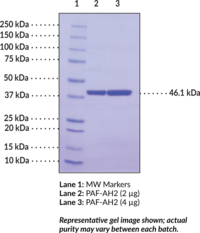Territorial Availability: Available through Bertin Technologies only in France
- Correlated keywords
- PAFAH2 PAFAH-2 Cytoplasmic acetyl-hydrolase sn2 CHOK1 Pafah-2 HSDPLA2 Escherichia Ultraviolet B WT FA
- Product Overview:
PAF acetylhydrolase 2 (PAF-AH2) is a serine-dependent, intracellular-type platelet-activating factor (PAF) acetylhydrolase that is expressed in a variety of tissue and cell types but is most abundant in the liver, kidney, testis, and intestines.{7103,42493,42494,42495} It contains an N-terminal myristoylation site and can translocate from the cytosol to cellular membranes in response to various stressors including UVB radiation, LPS, or oxidative stress, during which PAF-AH2 localizes to the endoplasmic reticulum and Golgi apparatus.{42493,5537} PAF-AH2 hydrolyzes and inactivates PAF, a phospholipid mediator involved in a variety of biological activities, including inflammation, smooth muscle contraction, and fetal development.{42493,42494,6501} It also hydrolyzes phospholipids with short-chain or oxidized fatty acids at the sn-2 position.{7103,42493} PAF-AH2 has demonstrated protective activities in various in vitro and in vivo models of oxidative stress.{42493,42495,5537} Overexpression of PAF-AH2 reduces cytotoxicity and apoptosis induced by tert-butylhydroperoxide (t-BuOOH) in CHO-K1 cells.{5537} Conversely, PAF-AH2-deficient (Pafah2-/-) mouse embryonic fibroblasts (MEFs) are more susceptible to t-BuOOH-induced cell death than wild-type MEFs.{42495} In addition, Pafah2-/- mice exhibit increased hepatic necrosis compared to wild-type animals in a mouse model of carbon tetrachloride-induced hepatic injury.
Cayman Chemical’s mission is to help make research possible by supplying scientists worldwide with the basic research tools necessary for advancing human and animal health. Our utmost commitment to healthcare researchers is to offer the highest quality products with an affordable pricing policy.
Our scientists are experts in the synthesis, purification, and characterization of biochemicals ranging from small drug-like heterocycles to complex biolipids, fatty acids, and many others. We are also highly skilled in all aspects of assay and antibody development, protein expression, crystallization, and structure determination.
Over the past thirty years, Cayman developed a deep knowledge base in lipid biochemistry, including research involving the arachidonic acid cascade, inositol phosphates, and cannabinoids. This knowledge enabled the production of reagents of exceptional quality for cancer, oxidative injury, epigenetics, neuroscience, inflammation, metabolism, and many additional lines of research.
Our organic and analytical chemists specialize in the rapid development of manufacturing processes and analytical methods to carry out clinical and commercial GMP-API production. Pre-clinical drug discovery efforts are currently underway in the areas of bone restoration and repair, muscular dystrophy, oncology, and inflammation. A separate group of Ph.D.-level scientists are dedicated to offering Hit-to-Lead Discovery and Profiling Services for epigenetic targets. Our knowledgeable chemists can be contracted to perform complete sample analysis for analytes measured by the majority of our assays. We also offer a wide range of analytical services using LC-MS/MS, HPLC, GC, and many other techniques.
Accreditations
ISO/IEC 17025:2005
ISO Guide 34:2009
Cayman is a leader in the field of emerging drugs of abuse, providing high-purity Schedule I-V Controlled Substances to federally-licensed laboratories and qualified academic research institutions for forensic analyses. We are certified by ACLASS Accreditation Services with dual accreditation to ISO/IEC 17025:2005 and ISO Guide 34:2009.





